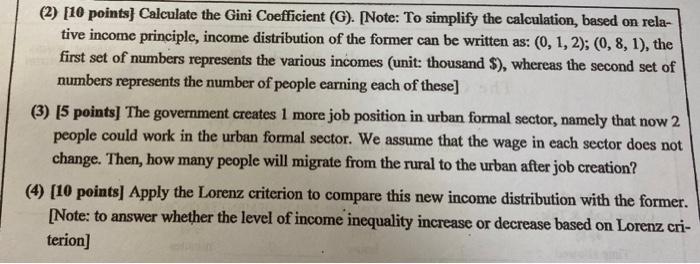Answered step by step
Verified Expert Solution
Question
1 Approved Answer
In an economy of 10 people, 8 people work in the rural sector with yearly in- come equal to $1000, 1 people in urban


In an economy of 10 people, 8 people work in the rural sector with yearly in- come equal to $1000, 1 people in urban formal sector with yearly income equal to $2000, and 1 people in urban informal sector with yearly income equal to $0. The probability of getting urban formal job de- pends on the proportion of such jobs to the urban labor force, exactly as in the Harris-Todaro model. (1) [5 points] Given the income distribution, please draw the Lorenz Curve of this economy. (2) [10 points] Calculate the Gini Coefficient (G). [Note: To simplify the calculation, based on rela- tive income principle, income distribution of the former can be written as: (0, 1, 2); (0, 8, 1), the first set of numbers represents the various incomes (unit: thousand $), whereas the second set of numbers represents the number of people earning each of these] (3) [5 points] The government creates 1 more job position in urban formal sector, namely that now 2 people could work in the urban formal sector. We assume that the wage in each sector does not change. Then, how many people will migrate from the rural to the urban after job creation? (4) [10 points] Apply the Lorenz criterion to compare this new income distribution with the former. [Note: to answer whether the level of income inequality increase or decrease based on Lorenz cri- terion]
Step by Step Solution
★★★★★
3.51 Rating (168 Votes )
There are 3 Steps involved in it
Step: 1
1 Given the income distribution please draw the Lorenz Curve of this economy The Lorenz Curve for th...
Get Instant Access to Expert-Tailored Solutions
See step-by-step solutions with expert insights and AI powered tools for academic success
Step: 2

Step: 3

Ace Your Homework with AI
Get the answers you need in no time with our AI-driven, step-by-step assistance
Get Started


